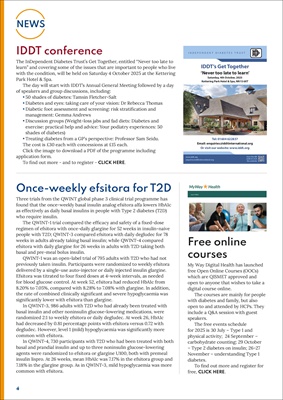
4
NEWS
IDDT conference
The InDependent Diabetes Trust's Get Together, entitled "Never too late to
learn" and covering some of the issues that are important to people who live
with the condition, will be held on Saturday 4 October 2025 at the Kettering
Park Hotel & Spa.
The day will start with IDDT's Annual General Meeting followed by a day
of speakers and group discussions, including:
• 50 shades of diabetes: Tamsin Fletcher-Salt
• Diabetes and eyes: taking care of your vision: Dr Rebecca Thomas
• Diabetic foot assessment and screening: risk stratification and
management: Gemma Andrews
• Discussion groups (Weight-loss jabs and fad diets: Diabetes and
exercise: practical help and advice: Your podiatry experiences: 50
shades of diabetes)
• Treating diabetes from a GP's perspective: Professor Sam Seidu.
The cost is £30 each with concessions at £15 each.
Click the image to download a PDF of the programme including
application form.
To find out more - and to register - CLICK HERE.
Once-weekly efsitora for T2D
Three trials from the QWINT global phase 3 clinical trial programme has
found that the once-weekly basal insulin analog efsitora alfa lowers HbA1c
as effectively as daily basal insulins in people with Type 2 diabetes (T2D)
who require insulin.
The QWINT-1 trial compared the efficacy and safety of a fixed-dose
regimen of efsitora with once-daily glargine for 52 weeks in insulin-naive
people with T2D; QWINT-3 compared efsitora with daily degludec for 78
weeks in adults already taking basal insulin; while QWINT-4 compared
efsitora with daily glargine for 26 weeks in adults with T2D taking both
basal and pre-meal bolus insulin.
QWINT-1 was an open-label trial of 795 adults with T2D who had not
previously taken insulin. Participants were randomized to weekly efsitora
delivered by a single-use auto-injector or daily injected insulin glargine.
Efsitora was titrated to four fixed doses at 4-week intervals, as needed
for blood glucose control. At week 52, efsitora had reduced HbA1c from
8.20% to 7.05%, compared with 8.28% to 7.08% with glargine. In addition,
the rate of combined clinically significant and severe hypoglycaemia was
significantly lower with efsitora than glargine.
In QWINT-3, 986 adults with T2D who had already been treated with
basal insulin and other noninsulin glucose-lowering medications, were
randomized 2:1 to weekly efsitora or daily degludec. At week 26, HbA1c
had decreased by 0.81 percentage points with efsitora versus 0.72 with
degludec. However, level 1 (mild) hypoglycaemia was significantly more
common with efsitora.
In QWINT-4, 730 participants with T2D who had been treated with both
basal and prandial insulin and up to three noninsulin glucose-lowering
agents were randomized to efsitora or glargine U100, both with premeal
insulin lispro. At 26 weeks, mean HbA1c was 7.17% in the efsitora group and
7.18% in the glargine group. As in QWINT-3, mild hypoglycaemia was more
common with efsitora.
IDDT's Get Together
'Never too late to learn'
Saturday, 4th October, 2025
Kettering Park Hotel & Spa, NN15 6XT
Tel: 01604 622837
Email: enquiries@iddtinternational.org
Or visit our website: enquiries@iddtinternational.orgNDENT DIABETES TRUST
www.iddt.org
enquiries@iddtinternational.org
Scan the QR
code to visit
the website
Free online
courses
My Way Digital Health has launched
free Open Online Courses (OOCs)
which are QISMET approved and
open to anyone that wishes to take a
digital course online.
The courses are mainly for people
with diabetes and family, but also
open to and attended by HCPs. They
include a Q&A session with guest
speakers.
The free events schedule
for 2025 is 30 July - Type 1 and
physical activity; 24 September -
carbohydrate counting; 29 October
- Type 2 diabetes on insulin; 26-27
November - understanding Type 1
diabetes.
To find out more and register for
free, CLICK HERE.